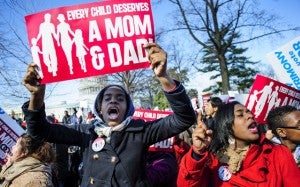Today at the Supreme Court: Same-Sex Marriage and California’s Proposition 8
Derrick Morgan /
This morning, the Supreme Court heard oral arguments in Hollingsworth v. Perry, a constitutional challenge to California’s definition of marriage as the union of a man and woman.
During the oral argument, both Justices Anthony Kennedy and Samuel Alito noted that same-sex marriage was a very recent experiment—just over a decade old—and questioned whether the justices are best suited to judge the results of that experiment when the institution of marriage has thousands of years of history.
As Heritage scholar Ryan Anderson has noted, social science is clear that the optimum circumstances for children are a married mother and father. Social science is still developing and not at all clear on the effects on children of same-sex parents. As Justice Kennedy remarked, those who wish to overturn the California law are really asking the court to go into “uncharted waters.”
Another major theme of the morning was the question “Who should decide what marriage is: the people or the courts?” As John Eastman argues in this Heritage Legal Memorandum, the risks of taking the decision away from the people are too great and support the notion that the Court should not enshrine in the Constitution a right to same-sex marriage. Eastman makes the case that marriage:
developed in large part to encourage the procreative relationship that is necessary for the perpetuation of society. No one knows the extent to which redefining marriage so substantially as to include relationships that are biologically not connected to that societal purpose will undermine the institution itself.
In a line of questioning, Justice Scalia continually pressed Ted Olson (who was advocating for a redefinition of marriage) about when the traditional definition of marriage became unconstitutional: 1791? 1868? When? Olson could not answer when. Clearly this was a discussion about the nature of the Constitution: Is it a living, evolving document, or should judges adhere to its original public meaning?
Even President Obama’s solicitor general was not calling for a nationwide redefinition of marriage applicable to all states. He said the Court should look only at California (which allows civil unions and provisions for gay adoption, for example, depriving it of some powerful traditional marriage arguments) and not redefine marriage for all states.
Clearly, the Court should not impose a nationwide solution but rather allow the people to decide through their legislatures or by voter initiative whether to recognize same-sex marriages. That is just what California did through an initiative, and the Court should uphold the right of the people to so decide.
Tomorrow, the Court will consider the constitutionality of the Defense of Marriage Act, which defines marriage for purposes of federal law as the union of one man and one woman.

